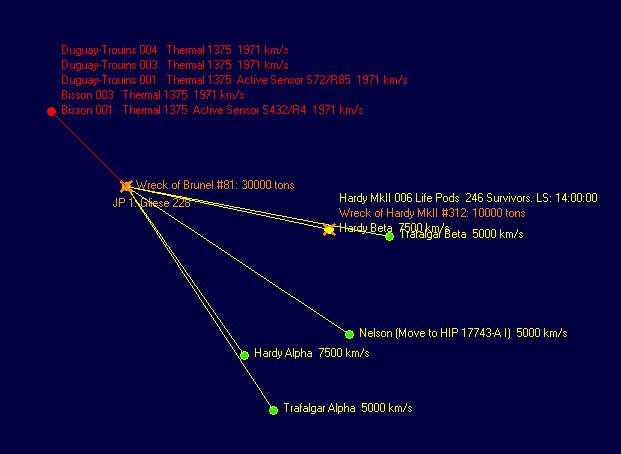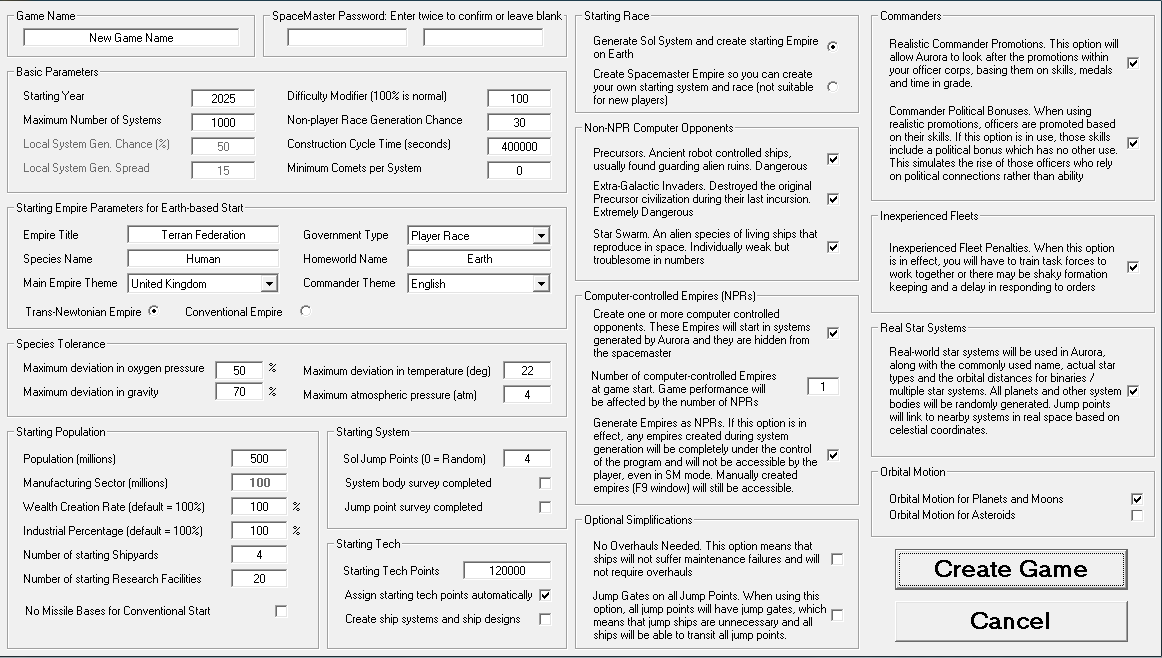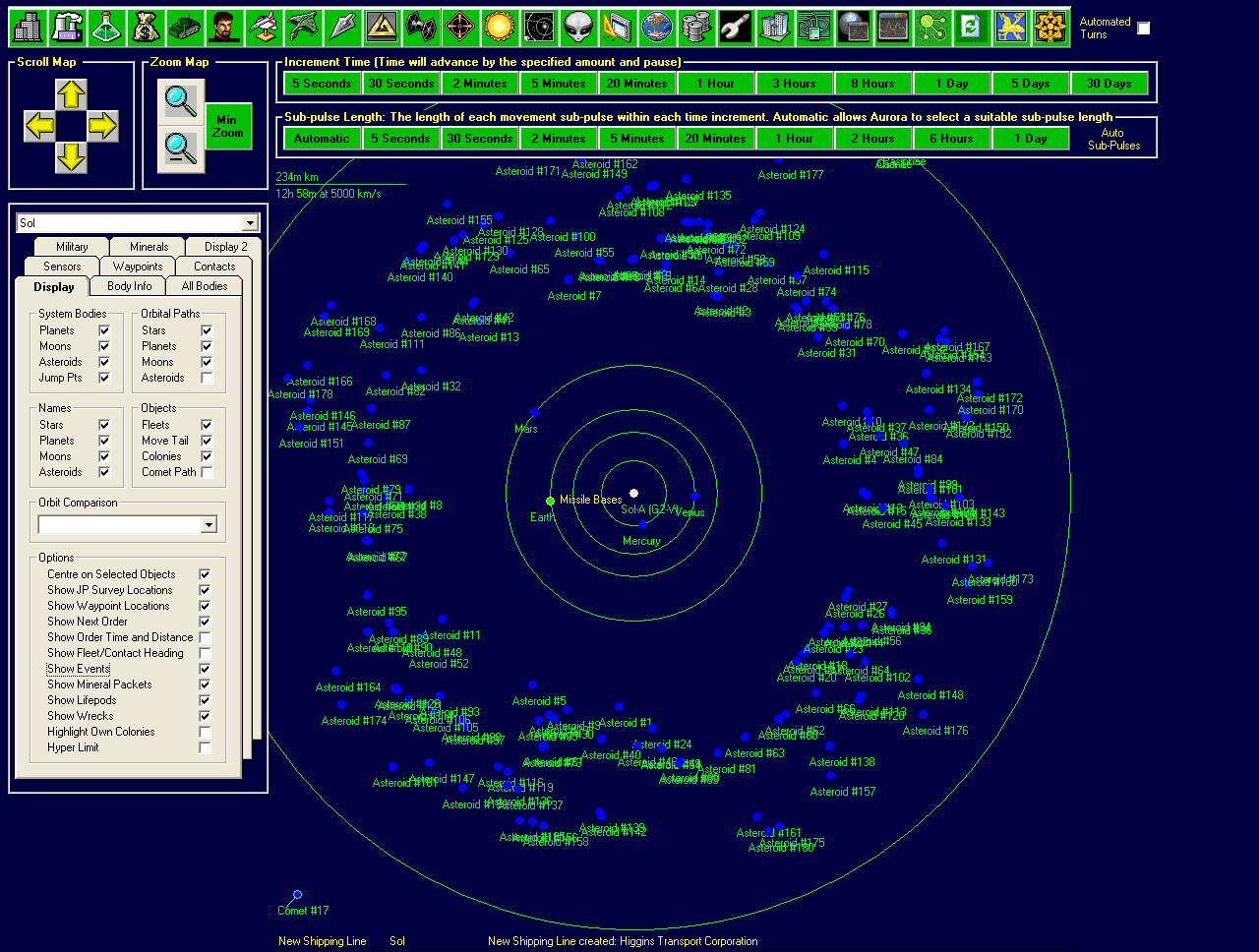Toggle Background Color
In space, no-one can hear you break tables ? Let?s Play Aurora!

If you can't tell, this is a tremendously exciting battle. In space.
What is this game?
Aurora is a space-based 4x game that?s been described by the overexcitable sperglords of the Bay12 forums as the ?Dwarf Fortress? of the 4x genre. This is an understandable comparison to make; both games come from a single programmer with a gift for mathematics, are almost inevitably buggy and have interfaces designed to terrify the user. There, however, the comparison ends: unlike Toady, Aurora?s designer Steve Walmsley has utilised his mathematical skills to become a professional poker player, both online and offline. Aurora is a game he?s put together to provide a basis for his fiction, and only incidentally offers it to the public. Truly, he?s living the dream, assuming the dream is to gamble feverishly against pixellated opponents while internet grognards scream that the thing you gave them for free isn?t an immaculate product born from the loins of Blizzard.
The game?s unusual origin gives rise to a few oddities in its design. The first is that it?s programmed in Visual Basic and is entirely Windows-based. The second is that because Steve has several really big monitors (really, this is genuinely the reason) it?s only playable in a desktop resolution of 1240x768. There are various utilities that enable you to scroll your desktop available on the wiki. The third is that it?s as buggy as hell. My personal favourite bug is that if your ground forces attack and defeat an enemy on one of your worlds, it?ll spontaneously create an empty colony on that same world that counts as ?Conquered?, with appropriate limitations for output. Normally, you should be able to just abandon that colony, but if you?re simultaneously hunting through alien ruins (which occasionally spawns hostile robotic armies your ground forces need to defeat), you?re likely to find that new colony contains some of the salvaged facilities you?ve been working to uncover. You?ll need to bring in a freighter to pick them up and then put them down in exactly the same place to move them to your first colony. However, in the interim, private-sector colonists have gone ?Hey! A whole new place for us to live!? and rushed to fill in the apparent new colony with thrusting entrepreneurs. You?ll need to bring in your own colony ship to move them to the actual colony or, you know, commit genocide. Whichever floats your boat.
So why play it?
Because it?s a game designed to tell stories, specifically grand, sweeping space opera-style stories, which as a lifelong scifi nerd I greatly appreciate. It has a unique atmosphere ? in no other game have I genuinely been a tiny bit afraid to send a motley collection of ships to a system far away from any inhabited worlds to confront a largely inscrutable alien menace. And, perhaps most importantly of all, it?s the one game in all the genre that really reminds me of Stars!, the late 90s 4x game that stole Excel 98?s graphics engine.
Yes, there are ridiculous levels of micromanagement, including shipping particular quantities and types of minerals to your colonies, inventing three types of fire control for three types of laser ? and then having to tell your ships which fire control matches which laser, and then when exactly to fire, assigning administrators to ALL your colonies by hand, and oh god so much more it?s occasionally painful. As has been pointed out to me, the game looks much more like work than an actual game. The learning curve is actually a circle; it?s entirely possible to start a game and by the end know less than when you began.
It?s glorious nonetheless, and my intent in this LP is to explore how it works in an accessible format (the wiki being written by people whose approach to exposition is to shit information at you) to give other people the chance to play it and create their own stories. It?s a sandbox game, so there?s no clear ending. However, like Dwarf Fortress, Aurora has a propensity towards curing stupid player decisions really really quickly. I?ve been playing for a couple of months now, and I?ve yet to actually fight any of the computer opponents, mostly because I can never find them. I therefore have no idea how this LP will end, but I can assure you that it will, most likely very abruptly.
I will aim for regular weekly updates ? but the sheer length of time it takes Aurora to process time intervals on my ageing PC means that there may be delays before enough interesting stuff happens to make an update worthwhile.
So what if I want play?
Installation of Aurora is unnecessarily complicated, in keeping with the rest of the game. You?ll need to download the 4.91 installer from here, follow the instructions (really, follow the instructions, this isn?t just an unzip job) and then download and install the 5.3 patch from here. I won?t cover playing the game in the first couple of posts, so if you?re anxious to shoot ahead you can chance your arm with the wiki, here.
Without further ado, let?s actually kick this game off.
Game Setup
This is Aurora?s game setup screen:

Assuming anyone?s still reading, I?m going to explain how this works ? at least for the bits which aren?t immediately obvious.
SpaceMaster Password
SpaceMaster is the game-editing mode; useful if you want to set up a game using specific conditions or, you know, cheat. It?s rather complicated (surprise) and I won?t be covering it in this LP as I?M NOT A CHEATER.
Basic Parameters
?Maximum Number of Systems? is the number of systems generated on game start. 1000 is described by the wiki as a normal value for this number. It can take decades of in-game time to properly colonise a single system (corresponding to hours of realtime), which tells you a lot about the people who wrote the wiki. We?ll be going for 100.
?Local system? stuff is actually reasonably well explained by the wiki:
Local System Generation Chance and Local System Generation Spread determines how much 'clustering' there is in a random game. This is something you don't need to worry about yet so you can skip this paragraph if you like. Still here? Well here we go then. In a 1000 system game, the program will select a number from 1-1000 when generating a new system. If the Local System Generation Chance is 50% then there is a 50% chance that instead the program will pick a number close to that of the current system. Just how close depends on the Local System Generation Spread. If your current system is number 100 and the Local System Generation Spread is 15, then if a local system is selected it will be between 85 and 115. Why does this make a difference? Well, if you pick a system that already exists when entering a jump point, you will create a link to a new system. If every system was generated randomly from 1-1000, the galactic map will probably comprise a large number of independent chains of systems stretching out form your start point. If the number range selected is small then there is a lot more chance of encountering nearby systems so you generate a far more inter-connected universe with a lot of connections between chains and loops of systems.
We?ll be setting it to 75%, to avoid a rather randomly spread-out universe.
?Non-player race generation chance? is how likely it is that an additional AI race will be spawn when you enter a new system. We?ll be setting this to 0 so we can control how many players are in the game.
?Construction cycle time? determines how frequently economy stuff happens. We?ll be leaving this on default, which corresponds to five days of in-game time.
Empire Parameters
?Main Empire Theme? determines the automatically generated names for things like ships and stars. For example, if you choose ?United Kingdom?, every star will be named after a British city. We?ll be going for ?Terran Federation? which approximates real star names without quite so many ?Ross XXX? cropping up.
?Government Type? does mysterious undocumented things behind the scenes, allegedly. We?ll be going for ?Representative Democracy? in line with the plot I have in mind.
?Trans-Newtonian Empire/Conventional Empire? determines whether you start understanding the game?s sci-fi plot device or not ? in other words, whether you can build spaceships right from the get-go or not. Since this LP is intended to show how Aurora works, we?ll be starting as a Conventional Empire.
Species Tolerance
This determines which planets will be perfect for your race. All planets falling within these parameters are entirely habitable and require no extra infrastructure. Terraforming is possible in Aurora, but you can never change a planet?s gravity, so it?s the most important value within this section. Early versions of Aurora had the default for this set so low that you couldn?t colonise Mars. We?ll be leaving this on default, which does allow for Martian antics.
Starting Population
This section is pretty self-explanatory; the percentages affect the things you?d expect them to. It?s worth pointing out that your research rate is largely determined by the number of research labs you own ? we?ll be leaving this on 5, which is painfully slow but will give us time to explore the early game more. You can build more once the game?s started, of course. Everything will be on default ? and we?ll be keeping our missile bases, so that the Cold War doesn?t go entirely to waste.
Starting System
We?ll be setting the number of jump points in Sol to random. Jump Points are Aurora?s handwave for FTL travel, and the only way of getting between systems. Since we can?t get 0, let?s live dangerously.
Starting Tech
A big fat 0 for us.
Starting Race
We?ll be starting in Sol, because that?s where humans are from. I spit in the face of panspermia.
Non-NPR Computer Opponents
Spoilers!
?Precursors? are stupidly fast ancient robot ships chock-full of missiles. They hang around in a system shooting at anything that comes past, effectively rendering it uninhabitable until they?ve been destroyed. We?ll be keeping them in.
?Extra-Galactic Invaders? ? in my first game, I kept these guys in, assuming that they?d be like the Antarans in MOO2 ? you know, balanced. I was wrong. These chaps will appear in any system at any time and annihilate anything in it. Assuming you somehow get to a tech level where you can defeat their ships, you can?t take the fight to them and they?ll continue to spawn wormholes in any system at random. They?re also responsible for plenty of Aurora?s biggest drawback, slowdown. We won?t be keeping them in.
?Star Swarm? are your standard space insects. Fun for a giggle, we?ll be keeping them in.
Computer-controlled Empires
Welcome to one of Aurora?s more pointless distinctions. The SpaceMaster can create AI races, but you can also create AI races the SM can?t access. I suppose this is to prevent cheating, but given that the SM can spawn 1,000 DeathStars in five seconds, a race you can?t access seems a bit irrelevant.
Since we?re not going to cheat, this distinction is irrelevant to us. We?ll be going for 4 computer opponents.
Optional Simplifications
Both of these add depth to gameplay, so we?ll be leaving them in.
Commanders
I have no wish to promote my commanders manually, so the first option will stay on. Since in the universe we?re about to play success is determined by who you know rather than what you know, the second option will also stay on.
Inexperienced Fleets
This determines whether when you build fighting ships you have to leave them alone in a system for a year doing nothing ? sorry, ?training?. It adds absolutely nothing to the game beyond pointless delays, so we?ll be leaving it off.
Real Star Systems
Since you can?t control the number of systems if you leave this on, regrettably we?ll be using made-up stars. On the other hand, this does mean that our systems won?t all be called ?Dead Chap String of Numbers?. You know, when we do actually reach the stars, we?re going to have to do some work on our nomenclature.
Orbital Motion
We?ll leave this off for asteroids. Aurora will rape my processor anyway ? adding asteroids just means it?ll rape it really nastily.
Now that we?ve set up our game, we?ll hit the button and make a cup of tea while my processor emits high-pitched squeals. When it?s finished (and you?ve clicked ?OK? 100 times on the error messages that comes up), we?ll hit ?Start Game? and be presented with?

?this.
Yes, the game defaults to a menu bar on starting rather than the main screen. Not worry, hit F3 to bring up the System View:

This, ladies and gentlemen, is a screen you?re going to be seeing a lot of in this LP. I hope you like lines and dots!



